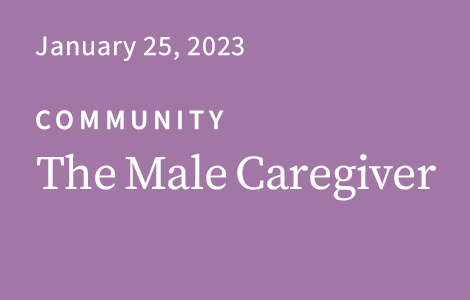Transcript
The Male Caregiver
One day, while working as a clinical psychologist in a primary care practice, I was asked by the family doctor meeting that morning with a 72-year-old woman with moderate dementia to see her 75-year-old husband for counseling for possible depression. Within the hour, I watched the couple arrive at our front desk. The husband was a big man gently escorting his petite wife by the elbow. While she stood there blankly, he joked with the receptionists. As they were led down the hallway to a medical exam room, he shook hands with every medical assistant and doctor they passed. This guy, I thought, looks cheerful, not distressed. When I briefly stopped by the exam room a few minutes later, he said with a broad smile, “I’m fine, doc. My wife has looked after me for 50 years. I can take care of her now. That’s the wedding vow I made.”
I was impressed by this husband’s dedication but wondered if he was truly fine. Many spousal dementia caregivers struggle emotionally watching their life partners decline. I also knew that male caregivers, especially spouses, tend to be stoical, avoiding expressions of negative feelings, and often declining others’ help. Another male dementia caregiver once told me that male dementia caregivers strive to be “a pillar of strength” to better support their spouses. If they’re not strong and hard as marble, that man had explained, then they fear they and their spouses might crumble and collapse.
During my more than 30 years as a psychologist specializing in supporting family caregivers, I’ve learned that being rigid as a pillar, unfortunately, can sometimes cause male caregivers to crack under dementia caregiving’s prolonged pressures and eventually become unable to continue providing care. I’ve also learned, though, that male caregivers usually refuse any suggestion to take care of themselves, viewing that as giving in to personal weakness. I’ve had to seek other ways of helping them feel more of their emotions and, consequently, become more flexible in their approach to caring for their spouses.
There is a common misconception that almost every family caregiver is female. But that has never been true and is less so now than ever. More men are stepping into this difficult role. According to the 2020 “Caregiving in the U.S.” report by the National Alliance for Caregiving and AARP, the number of American male caregivers increased from 16 million or 35 percent of all family caregivers in 2015 to more than 20 million or 39 percent in 2020.
Men often make great spousal dementia caregivers. They are frequently energetic, selfless, and single-mindedly determined to support their partners, refusing even the help of their adult children. My job has not been to criticize them for those qualities—they don’t generally put up with that, nor should they—but to help them self-reflect and consider other strategies to make their caregiving more sustainable.
I frequently start by talking about emotions. Not about their emotions per se. Men too often regard feelings as bothersome mental states like fatigue to ignore or push through. Instead, I say that many people have emotional reactions to seeing a loved one decline from dementia. I then engage them in a conversation about why human beings have emotions in the first place. After some discussion, we usually conclude that human beings are hard-wired with emotions like fear, sadness, anger, and guilt as important signals to them to pay better attention to the stressors in their environment and to prompt them to protect themselves and others. Seeing it from this perspective, some male caregivers begin to wonder if it is still a good idea to ignore those signals by shunting their feelings aside.
The next topic that frequently arises is men’s fears that feeling emotions will sap, not bolster, their resolve. This was the concern expressed by the man who wanted to be a pillar of strength and believed it would be impossible to feel sad and remain strong at the same time. Other men have told me that if they let themselves stop focusing on the many caregiving tasks that need to be done and, instead, attend to their emotions, it would be akin to “opening Pandora’s box.” So much feeling would pour forth that they would feel overwhelmed, lose control, and become unable to carry on.
I tell them that, in my experience from speaking with hundreds of male dementia caregivers over the years, the guys who keep their feelings buried inside are not stronger or less apt to become overwhelmed; rather, they tend to struggle more and eventually burn out. The guys who allow themselves to experience whatever they are feeling and then are curious about the meaning of those internal signals seem to carry on with dementia caregiving better and longer.
Lastly, I ask male dementia caregivers about the pros and cons of being, like actor Gary Cooper of yore, the “strong, silent, unemotional type” in their relationships with the spouses they’ve vowed to help. They nearly always respond by pointing out that, by keeping their emotions locked away, they are protecting their spouses from having to feel upset or guilty that their husbands are experiencing distress. I respond that care receivers with dementia almost always have their own fears, anger, and deep grief in response to the devastating changes overtaking them. I ask: What happens when those care receivers turn toward their spouse to be a warm, comforting partner during those difficult times and the male caregiver is attempting to be a cool marble pillar instead? Important tasks, such as keeping medical appointments or managing medications, may get done more quickly and efficiently without concession to feelings, but the relationship suffers. Pushing past feelings to stay strong tends to make those life partners more emotionally distant from one another at a time when they are both facing enormous stress. In contrast, commiserating in mutual sadness brings spouses together in loving communion and support.
Other family members, too, find male stoicism to be a problem. I’ve heard many adult children complain that their fathers are being stubborn and controlling by playing the he-man and not allowing them to help their mothers with dementia. They don’t think it’s fair to them to be deprived of the opportunity to give back to parents who took care of them earlier in their lives. They also worry their fathers will burn out or develop their own health problems because of chronic caregiving strain. “I’m losing my mother,” some have said. “I don’t want to lose my father as well.”
To these adult children, I offer three pieces of advice:
- Don’t fight for control of the caregiving. Male dementia caregivers often need to feel in charge to better control their feelings. Trying to wrest part of the caregiving role away from them would mean exposing them to guilt and whatever other emotions they’ve been avoiding. They will dig their heels in and fight to prevent that.
- Don’t offer help; ask for it, such as their watching grandchildren or fixing things. It sounds paradoxical, if not cruel, to say to oneself, “Gee, Dad seems exhausted. Let me add to his pile of chores by asking him to help me.” The advantage, though, is that the adult child will be appealing to, rather than challenging, the male dementia caregiver’s cherished role. Once that role has been acknowledged and supported by the adult child, the father may be less rigid about accepting help from the child in return.
- Try showing up. Adult children can bring over a covered dish because they “accidentally” made too much of a delicious meal. They can arrive with a mower to trim the parents’ lawn without having to be asked. Or they could just stop by unannounced to provide pleasant company. It’s the churlish father who would reject outright those sweet gestures.
Without question, hardworking and long-devoted male dementia caregivers do enormous good. But to continue to be able to provide care, they need encouragement to bring all of themselves—including their emotions and some degree of flexibility—to caregiving. Otherwise, they will check off tasks on a to-do list but keep others at a distance. There is so much loss already with dementia, it would be tragic for them to compound those losses further through their efforts to protect themselves.
Barry J. Jacobs, PsyD
Principal
Health Management Associates
www.loveandmeaning.com

